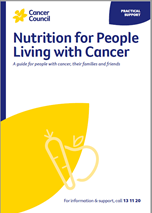- Home
- Cancer Information
- Cancer treatment
- Chemotherapy
- Managing side effects
- Constipation or diarrhoea
Constipation or diarrhoea
Some chemotherapy drugs, pain medicines and anti-nausea medicines can cause constipation or diarrhoea. Tell your doctor, pharmacist or nurse if your bowel habits have changed.
Some people experience ongoing bowel problems after cancer treatment. If you find that dietary fibre makes any bowel problems worse, you may need to eat low-fibre foods. See the tips below for ways to manage bowel issues at home.
Learn more about:
How to manage diarrhoea
- Choose bland foods such as clear broth, boiled rice or dry toast. Avoid spicy foods, wholegrain products, fatty or fried foods, rich sauces, and raw fruits or vegetables with skins or seeds.
- It may help to eat foods that are high in soluble fibre such as oats, white bread, white rice, bananas and pasta.
- Limit alcohol, fruit juice, soft drinks, strong tea or coffee, and foods containing artificial sweeteners as these stimulate the bowel.
- Drink plenty of water to help replace fluids lost through diarrhoea.
- Talk to your treatment team. They may change the drugs or doses or suggest other solutions, such as using over-the-counter medicines.
- If diarrhoea is severe or ongoing, let your treatment team know. It can cause dehydration and you may need to go to hospital.
How to manage constipation
- Eat more high-fibre foods, such as wholegrain bread and pasta, fruits and vegetables, bran, nuts and legumes (e.g. baked beans or lentils).
- If you are having treatment for bowel cancer, ask your treatment team if there are any foods you should or shouldn’t eat to help avoid constipation.
- Drink plenty of fluids, both warm and cold. Prune, apple or pear juice can work well.
- Do some light exercise, such as walking.
- Ask your doctor about using a laxative, stool softener or fibre supplement.
- Avoid enemas or suppositories as they may cause infection.
- Let your treatment team know if you have constipation for more than a couple of days. They will be able to help.
Podcast: Appetite Loss and Nausea
Listen to more episodes from our podcast for people affected by cancer
Prof Timothy Price, Medical Oncologist, The Queen Elizabeth Hospital, SA; Graham Borgas, Consumer: Dr Joanna Dewar, Medical Oncologist and Clinical Professor, Sir Charles Gairdner Hospital and The University of Western Australia, WA; Justin Hargreaves, Medical Oncology Nurse Practitioner, Bendigo Health Cancer Centre, VIC; Angela Kritikos, Senior Oncology Dietitian, Dietetic Department, Liverpool Hospital, NSW; Dr Kate Mahon, Director of Medical Oncology, Chris O’Brien Lifehouse, NSW; Georgie Pearson, Consumer; Chris Rivett, 13 11 20 Consultant, Cancer Council SA; Marissa Ryan, Acting Consultant Pharmacist (Cancer Services), Pharmacy Department, Princess Alexandra Hospital, QLD.
View the Cancer Council NSW editorial policy.
View all publications or call 13 11 20 for free printed copies.
Need to talk?
Support services
Coping with cancer?
Ask a health professional or someone who’s been there, or find a support group or forum
Looking for transport, accommodation or home help?
Practical advice and support during and after treatment
Cancer information
Managing cancer side effects
Detailed information on coping with the most common side effects experienced by people with cancer
Nutrition and cancer
Learn how to eat well after a cancer diagnosis
